A free press is the cornerstone of every thriving democracy. As such, Lima Charlie News has continued to report about oppressive censorship and the intimidation, jailing and even the murder of journalists in such places as Turkey, Africa, Russia and Egypt. This includes some of the challenges we now face even in our own country.
With all of the Fake News coming out of NBC and the Networks, at what point is it appropriate to challenge their License? Bad for country!
— Donald J. Trump (@realDonaldTrump) October 11, 2017
Freedom of expression continues to be under assault as well, with Egyptian authorities announcing jail time for “mocking” the Egyptian flag, as well as detaining citizens for displaying a rainbow flag.
57 people detained in #Egypt after rainbow flag flown at a concert. This persecution must stop. Take action ↓ https://t.co/ryeXqr3KuK
— Amnesty UK (@AmnestyUK) October 15, 2017
#AMAY| One-year jail, LE30,000 fine to anyone who mocks Egyptian flag: Education Minister https://t.co/3ORF1IkCVd
— Egypt Independent (@EgyIndependent) September 23, 2017
In light of these developments, Lima Charlie reached out to the people behind the scenes of the critically acclaimed ode to free speech, “Tickling Giants.”
[Don’t forget to read John Sjoholm’s full review of the film here.]
Directed by Sara Taksler, the film tells the story of Egyptian heart surgeon, Bassem Youssef, and how he became the “Jon Stewart of Egypt” during the Egyptian Arab Spring (or “Egyptian Revolution”). The film was shot almost entirely in Egypt, a country that does not respect freedom of speech, and is spoken primarily in a language foreign to the director, the editors, and the intended audience. When filming began in 2012, Sara Taksler did not know the trajectory that Bassem Youssef’s show (a political satire known as B+, later Al-Bernameg) or his career would take.
The show would go on to be the most popular in the Arab world, drawing 30-40 million viewers regularly, and more than 184 million combined views on YouTube alone. It would eventually be cancelled due to intense pressure from the Egyptian government, which claimed that Youssef’s show was “circulating false news likely to disturb public peace and public security and affect the administration.”
The New York Times has called Taksler’s film “first rate,” Variety called it an “ebullient ode to freedom,” and James Gunn, the director of “Guardians of the Galaxy,” called the movie “harrowing and moving.” And of course, Lima Charlie’s own John Sjoholm, a combat veteran and Middle East operative who discovered Youssef while “on assignment” during the 2011 Egyptian Revolution, called it a “brilliant film” giving it “4.5 out of 5 bowls of fūl.” (We highly recommend that you read the review that features an interview with the director herself – Editors).
“Tickling Giants” also has an aggregate score of 100% on Rotten Tomatoes. All this said, there is not much more we can do to convince readers to see this film.
What we can offer instead is an insider’s perspective on the making of the film and the people who made it. Some of the greatest challenges of filmmaking are often invisible to the moviegoer, and this is true of this documentary.
Through making the film, many of the English speaking crew learned for the first time about Bassem Youssef and the Arab Spring, and many of the Arabic speaking crew relived the hopes and nightmares they experienced in those turbulent years. To capture this, questions were sent to members of the crew, asking them to share their experiences. Below are some of their answers.
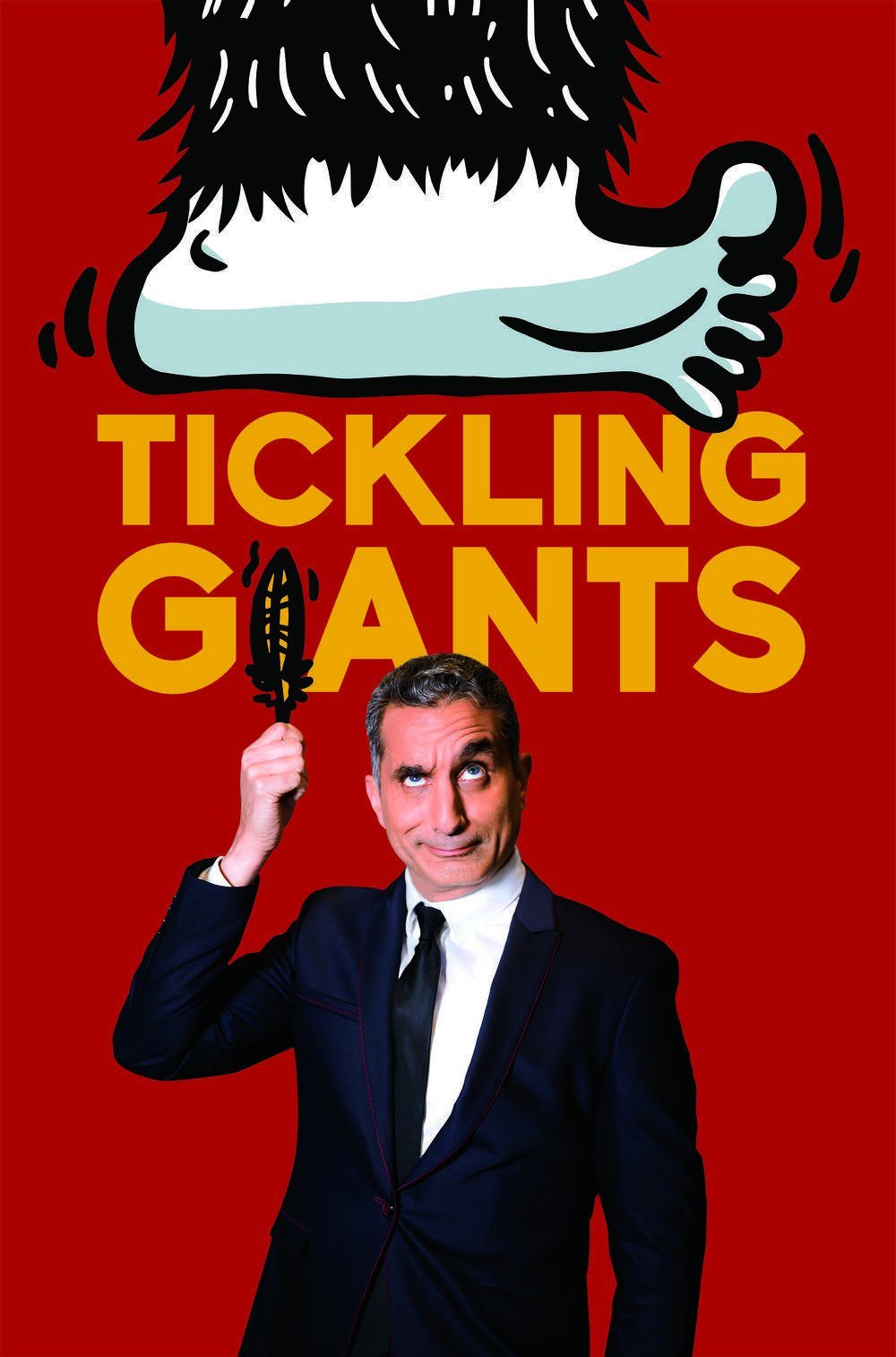
Q. Did you know about Bassem before working on the film? If so, what was your opinion of him?
Moaz El Farouk (Assistant Editor): I knew about Bassem since he started his journey on YouTube back in 2011. I always believed in him as the voice of all young people of Egypt.
Rachel Bozich (Assistant Editor): I did not know Bassem beforehand, but was stunned how quickly I grew to admire him and his work.
Cyril Aris (Assistant Editor): Yes, of course, all Middle-Easterners knew of him. I knew he was the Egyptian Jon Stewart, and had seen some of his show. I was happy to see such free speech in such an oppressive country. It gave everyone hope.
Jamie Canobbio (Editor): Once I started on the project and had the chance to work with all the footage it was easy to see what people in Egypt loved about him. He’s a magnetic figure. Very charming and charismatic. He’s a person well equipped to lead, much like a politician. It was fascinating to tell the story of an ordinary person who suddenly finds fame and is inadvertently burdened with being the voice of an entire country.
Salah Anwar (Assistant Editor): Yes, I was born in Egypt then I moved here [to the US] in 2010 and I watched his show on YouTube all the time and later on TV until he was banned. I liked his groundbreaking work and at the same time I didn’t hesitate to criticize some of his opinions, but unlike a lot of Egyptians in Egypt I kept in mind that it’s sarcasm, not real life, and that no one is perfect.
Q. Tell us a story about a day, project, or a scene, that was particularly challenging.
Ahmed Al Baz (Cameraman): A particularly challenging scene was when an angry mob surrounded the theatre where Bassem shoots the show. I had to go out to them, film them, and interview them without them knowing that I worked with Bassem because if they knew, no one could predict what they’d do to me.
Moaz El Farouk: In the film, we covered the violent response in Egypt after the military coup back in July 2013. During these events two of my close friends were killed by military forces. It was really challenging for me to remain strong emotionally, especially when I have to watch and cut hours and hours of footage that reminds me of my lost friends.
Rachel Bozich: The most difficult aspect was the film being in Arabic. A lot of times we’d think we cut this amazing scene together and then we screened it, our Arabic speaking crew members would tell us that the joke we wanted to land wasn’t the same in Arabic or our subtitles were off. Made the editing process quite difficult, but fun.
Cyril Aris: It’s not really a specific story or a specific day, but it’s mostly the creative clash that happens between the heads of post-production (editor, post-prod sup, director, exec producer etc.) on agreeing what the story will be. Documentaries are usually created in the edit, so agreeing on the tone and the overall message of the film was the most challenging aspect, in my opinion. The story in itself is a sad story, but, by virtue of the fact that it happened, it becomes a hopeful story. So that dichotomy between agreeing on whether we are making a tragedy or a more hopeful story was both challenging and unique at the same time.
Ahmed Naguib: I can’t really recall a certain incident, but Bassem and his show were a very touchy subject. Anything that Sara wanted to do outside the sphere of Bassem and his team was quite challenging given our concerns over her safety, as well as fears of running into problems with certain entities in the country.
Tyler Walk (Editor): Finding an introduction to the movie was challenging. As with most documentaries, we tried so many opening scenes but none seemed to stick. We must have tried 20 or so. Do we go with a heavy mood or a light mood? Should we introduce Bassem first or Egypt? Finally Sara had the idea of starting the movie with a disclaimer, must like Bassem had on his show. It turned out to give the right amount of humor to contrast the very violent and context heavy following scene. Ultimately, I think it works well. When exploring such a heavy subject, it’s important to provide humor and moments of rest so the viewer isn’t overwhelmed.
Elena Mavrina (Assistant Editor): I think of all the transcribing we had to do and the challenges of dealing with language and cultural barriers. Working on this film I came to truly understand that it takes an army and a village to make a film. And if you want to make a really great film, having as diverse a team as we had makes all the difference.
Paul Tyan (Composer): The recording of the score was quite challenging but a lot of fun too. After all the music demos are locked, we started recording and spent a full week in the studio with musicians. This requires a lot of preparation (choosing the right performers, finalizing music sheets, etc.) and we ran on a tight schedule. We recorded a string section remotely with F.A.M.E’s orchestra in Macedonia. That experience was quite memorable, as the whole session was done via Skype (listening to their performance, giving feedback).
We put together a making-of that you can watch here:
Q. What was the most surprising thing you learned while working on the project?
Ahmed Naguib (Cameraman): Definitely the amount of time and effort that they put in every episode as well as being able to work under unreal external pressures. It was amazing witnessing all that. Al Bernameg’s team was and still is the best at what they did. It rarely happens when you have that much chemistry behind the scenes of a TV show here in the [Middle East].
Rachel Bozich: This film served as a looking glass for me into other cultures and into my own. The everyday freedoms most people take for granted, especially freedom of speech and the power to vote, things that many people throughout the world do not have. When it came to this past election, this film was a huge motivating factor for me and inspired me to get out there and encourage others to vote and speak their mind – not because they necessarily wanted to, but because we can and there are millions of people out there who don’t have that privilege.
Moaz El Farouk: Working on TG had so many surprises, but the most surprising thing was working on archive footage of a protest in Tahrir Square during the Egyptian revolution back in January 2011. Before wrapping up the film I was watching it over and over to take some notes and I found myself in the middle of the protest. It was a real surprising moment.
Cyril Aris: How many death threats they had received. I was on the outside, so I never really followed how much trouble Bassem went through because of this. The only time I heard of his troubles was when he went to court. But I never knew how many people loved him, and how many people hated him.
Katie Maraghy: I didn’t realize the scope and scale of the Arab Spring across the region. I obviously knew some of the basics and catalysts that drove the conflicts, but it wasn’t until I made the full timeline of events for our production team that I realized the extent of the revolution, all the entities involved, and the quick turnover as power changed hands over and over again.
Q. What was your favorite part about working on the film?
Ahmed Naguib: Definitely being the fly on the wall to the discussions that took place between Bassem, the writers, and the rest of the team. The team was quite diverse so it was like witnessing a mini Egypt, represented by different backgrounds and beliefs.
Moaz El Farouk: My favorite part of the film is the post-revolution and the beginning of Bassem’s show. It always makes me feel like we were able to earn our freedom as Egyptians and we can always earn it again if we wanted to. Also, the research part when I got to [research and hunt] for rare shots of historical moments. It feels amazing when I found really cool footage, that was really important, that nobody else has seen before.
Tyler Walk: I really enjoyed working with all the crew members. It was a collaborative experience. Everyone had the freedom to give feedback and ideas. The director was really fun to work with. There were many times where we’d find ourselves cracking up coming up with ideas and trying them in the edit. Some worked, some didn’t. It was fun to try everything we could.

Q. Have you had any interesting reactions from people you’ve shown the movie to?
Moaz El Farouk: All my friends who watched the film absolutely loved it. But it was really interesting when I attended a screening of the film in TriBeca 2016. We had Bassem at the screening to answer the audience’s questions after, and 3 people of the attending audience stood up while Bassem was answering questions. They insulted him in front of the audience, and yelled “traitor!” It turned out that they are supporting the military’s role in Egypt and they just attended the screening to defend their love for the dictatorship by insulting the free voice of Egypt.
Jamie Canobbio: My parents came to one of the screenings during the Tribeca Film Festival. They’re not exactly big movie buffs. I think their reaction was proof that we all did a pretty good job telling this story. They genuinely loved the film and were amazed by Bassem’s story and what’s happening politically in that part of the world. I think through humor, it’s so much easier to reach people and connect with them.
Paul Tyan: A friend of mine told me he cried and laughed several times during the film, because he could relate to some aspects of his own country (China).
Salah Anwar: No, I think people either like or hate Bassem Youssef. I remember a lot of my friends really liked the fact that I worked on a film about him and others just hated it.
Q. What is your favorite moment or sequence? (IF you can think of it, what was your favorite piece of footage that didn’t make it into the final cut?)
Amina Nada (Translator): My favorite moment is seeing Bassem with his daughter and him walking in the snow at the end of the movie. It gives hope to the viewers in a unique way. It looks like a scene in a fiction film.
Moaz El Farouk: My favorite moment was when Mubarak was forced to resign from his presidency.
Rachel Bozich: My favorite shot that didn’t make it into the film was by a freelance filmmaker. She positioned herself on top of a building and captured thousands of people praying in the middle of the street. Yet, the best part, in the middle of the shot, is a parked car – people surrounded the car on either side, all wearing different color clothing, and it was truly one of the most beautiful things I’ve ever seen.
Cyril Aris: I love the scene where they blow out the birthday candles of someone’s birthday, while violent protests are happening outside. It really reflects the state of the Middle East, in one scene only. Trying to survive, while surrounded with chaos and violence. It is not so much a question of denial, it is more a self-imposed denial as a means to simply survive.
Mansour Ahmed: There were some scenes in the original footage of a folklore Egyptian poet who I thought could have added a nice flavor to the story, but unfortunately his scenes were taken out.
Tyler Walk: There were so many characters and side stories that never made the cut due to time and other storytelling issues. There was a great scene with one of the show’s producers where she tunes in to watch the episode of the show that they had been producing all week and they find out that the show had been cut from the air. Her shock and panic was very vivid and was a great moment. We didn’t have Bassem’s reaction to the news on camera, but we found through test screenings that we really needed to be with Bassem somehow, not a side character, when he realizes his show was cut. Through voice over and several interviews with Bassem, we were able to construct a very emotional moment with him. It sets him up for the third act … should he continue the show, or not? What’s his purpose, how does he save his integrity. He must continue.
Katie Maraghy: The scene where some of the staff of Al Bernameg are crammed into this hallway, singing, smiling and laughing. There are these incredible women, standing together, pushing back against a government that doesn’t want their show to exist. I loved that.
They’ll laugh, they’ll cry, and they’ll learn something, too! Host a #TicklingGiants screening in your community: https://t.co/V500JhyBRL pic.twitter.com/KCPnxV5RJG
— Tickling Giants (@Tickling_Giants) September 8, 2017
[Main image: Pedro Ugarte/AFP]
David Polsdorfer, with Anthony A. LoPresti, Lima Charlie News
David Polsdorfer served in the United States Navy from 2008 until 2013 as a Cryptologic Technician Collector. He worked in the intelligence community at NIOC Hawaii and completed one tour to Afghanistan in 2011 as an LLVI operator. In 2014 he was selected to be part of The Daily Show’s Veteran Immersion Program and continued there as an intern in the fall. In 2015, he worked as a production assistant with Sara Taksler and Sarkasmos Productions, LLC on the documentary film, Tickling Giants. He recently received his Bachelor’s from Columbia University in Political Science. He writes and edits. Follow David on Twitter @DPolsdorferLC
Lima Charlie provides global news, insight & analysis by military veterans and service members Worldwide.
For up-to-date news, please follow us on twitter at @LimaCharlieNews
In case you missed it:

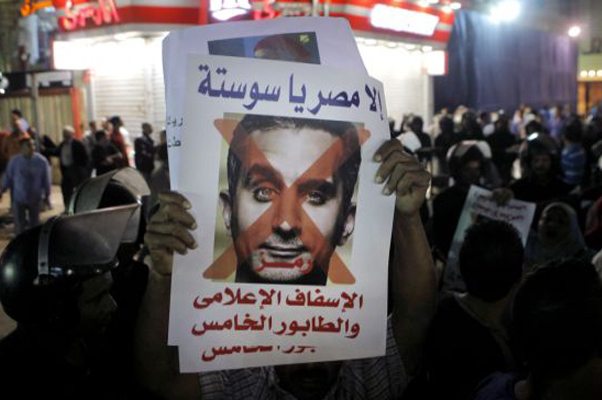
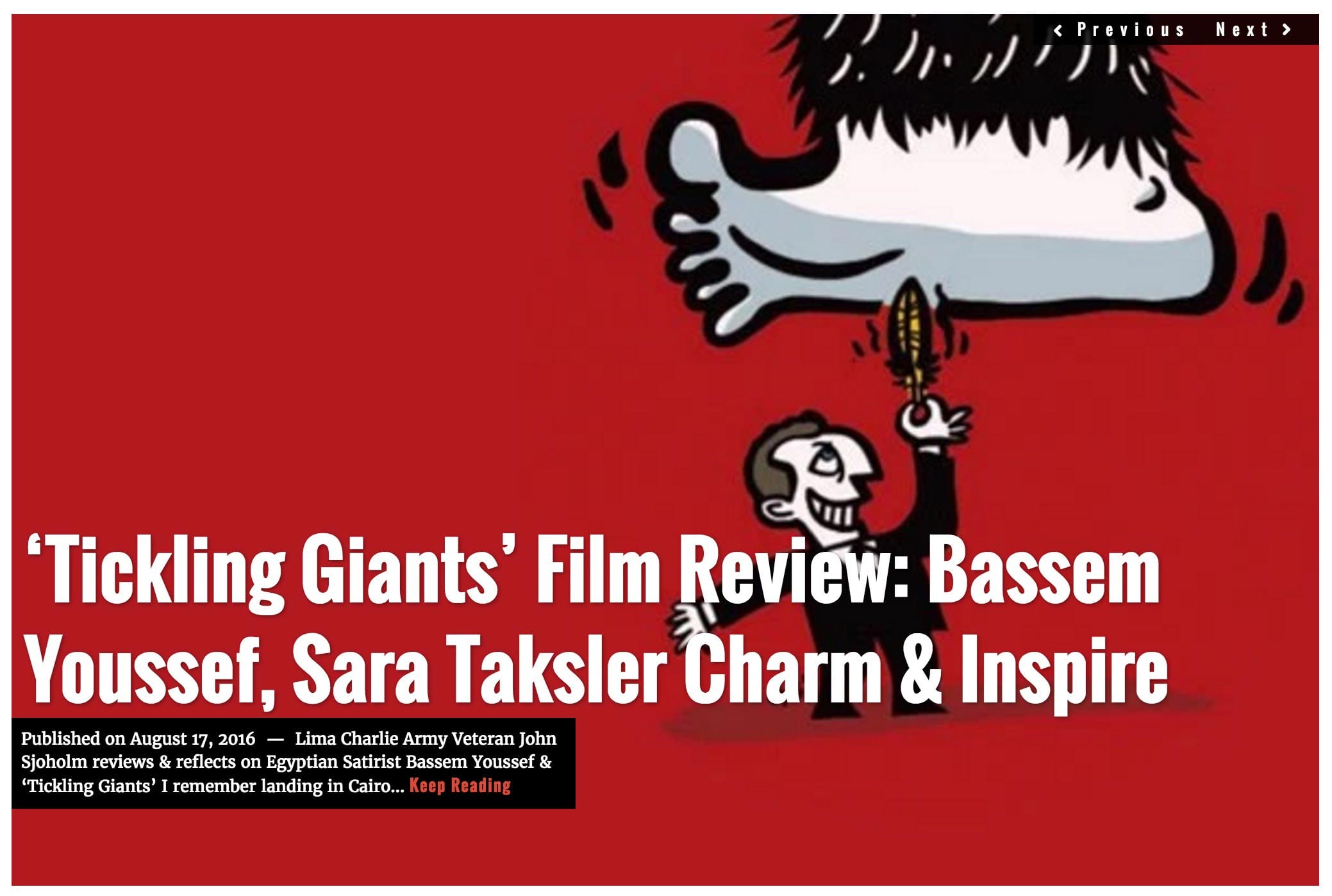
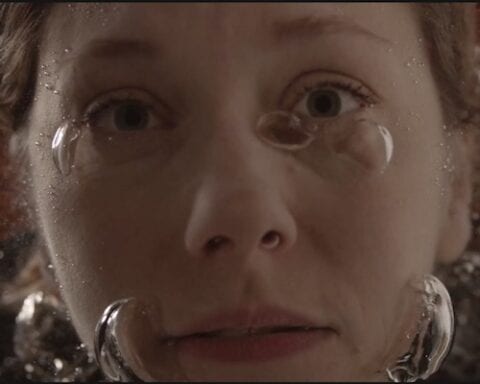
![Image World Press Freedom Day has us asking ‘What is the state of free press in democracies worldwide, and why has America’s free press ranking dropped?' [Lima Charlie News]](https://limacharlienews.com/wp-content/uploads/2019/05/World-Press-Freedom-Day-01-480x384.png)
![Image Welcome to Jordan! A buffer in a region of little stability, the Hashemite Kingdom faces enormous obstacles [Lima Charlie News][Photo: Salah Malkawi]](https://limacharlienews.com/wp-content/uploads/2018/08/Welcome-to-Jordan-480x384.png)
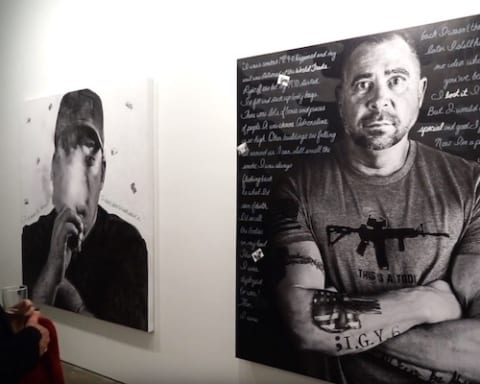
![Image China's football fever and FIFA - a World Cup match made in heaven [Lima Charlie News]](https://limacharlienews.com/wp-content/uploads/2018/07/Chinas-football-fever-and-FIFA-a-World-Cup-match-made-in-heaven-480x384.png)
![Image Life after the Marine Corps - a 360 with skateboard artist Rafael Colon [Lima Charlie News]](https://limacharlienews.com/wp-content/uploads/2018/04/RafaelColon-480x384.jpg)
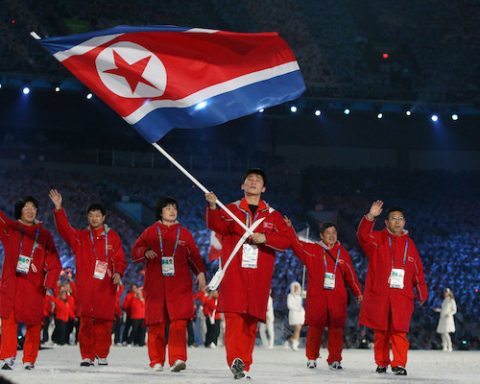

![Image World Press Freedom Day has us asking ‘What is the state of free press in democracies worldwide, and why has America’s free press ranking dropped?' [Lima Charlie News]](https://limacharlienews.com/wp-content/uploads/2019/05/World-Press-Freedom-Day-01-150x100.png)